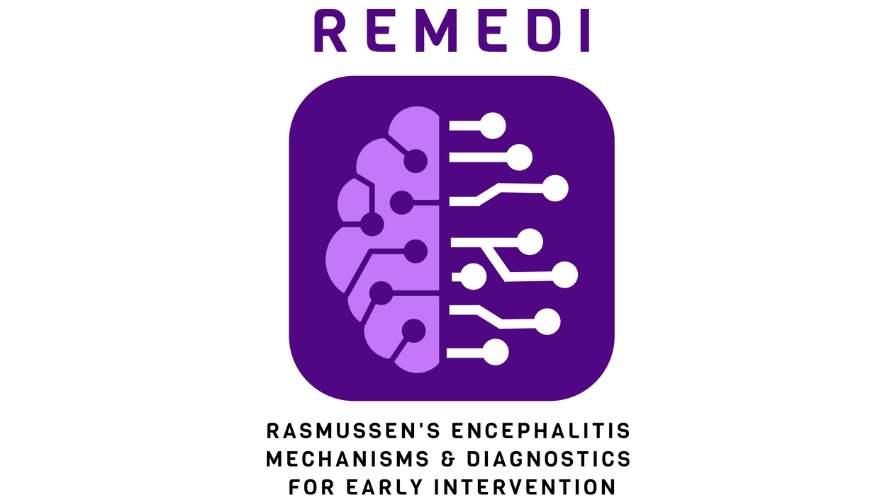Rasmussen’s encephalitis (RE) mainly affects children and is marked by chronic, progressive inflammation in one side of the brain and frequent seizures, one-sided weakness or paralysis, and gradual mental decline. Dr Eva Ioannidou of UCL Great Ormond Street Institute of Child Health is carrying out laboratory research to deepen understanding of the underlying mechanisms driving this very rare condition. Her findings have the potential to lead to earlier diagnosis, while also providing important new clues for the development of new treatments. Ultimately, this research has the potential to transform care and improve outcomes for children affected by RE and their families.
This project is jointly funded by Action Medical Research and the British Paediatric Neurology Association (BPNA).
How are children’s lives affected now?
Most children are healthy before developing RE. Seizures are typically the first sign of the condition, which usually become more frequent over time and can’t fully be controlled with medications.
“Other symptoms include progressive learning difficulties and weakness of one side of the body, often leading to complete paralysis,” says Dr Ioannidou. “If the left side of the child’s brain is affected, their speech and language abilities may also be severely impacted.”
Unfortunately, there’s no cure for RE – instead, the goal of treatment is to manage symptoms and inflammation. The only way to stop seizures and prevent further mental decline is a major operation to disconnect the affected half of the brain. However, this surgery can have life-changing consequences, such as permanent vision or speech loss.
“By the time most children are diagnosed with RE, irreversible brain damage has often already occurred,” says Dr Ioannidou.
There’s an urgent need for new tests that can diagnose the condition earlier, so treatment can begin sooner – potentially halting disease progression and avoiding the need for drastic surgery.
How could this research help?
“We’re aiming to gain new insights into the underlying biological mechanisms driving RE – and identify potential biomarkers* that could pave the way to earlier diagnosis,” says Dr Ioannidou.
The researchers will study brain tissue collected from children with RE who have undergone surgery, along with cerebrospinal fluid – the liquid surrounding the brain and spinal cord – and blood samples.
“Using a range of cutting-edge technologies, we will search for molecular clues – such as gene changes in brain tissues or the presence of specific proteins produced by immune cells – that could serve as early indicators of the disease,” says Dr Ioannidou.
An improved understanding of the underlying mechanisms behind the development and progression of RE could also open new avenues for developing more effective treatments.
While this laboratory research is still in its early stages, it could ultimately lead to better tests and treatments that can help improve the lives of children with this devastating condition.

This study is called the REMEDI study and brings together scientists, doctors, patients, and families to better understand Rasmussen Encephalitis, a rare and devastating form of epilepsy in children. By using cutting-edge techniques and working closely with families every step of the way, the study aims to understand and find early warning signs of the disease—giving hope for earlier diagnosis and better outcomes.
*Biomarkers are measurable changes in the body found in blood, other body fluids, or tissues, that can help doctors monitor health, diagnose disease, and assess treatment effectiveness.
*Research Training Fellowships:
Each year, Action Medical Research awards these prestigious grants to help the brightest and best doctors and researchers develop their career in medical research.
Research table
Project details
| Project Leader | Dr Eva Ioannidou, MBBS MSc MRCPCH |
| Location | Developmental Neurosciences Department UCL Great Ormond Street Institute of Child Health |
| Project Team |
Professor Helen Cross, MBChB PhD FRCPCH FRCP OBE
Professor Thomas Jacques, MA PhD MB BChir MRCP FRCPath Dr Amy McTague, MBChB MRCPCH PhD Dr Marios Kaliakatsos, MD MSc PhD Dr Suresh Pujar, PhD MRCPCH |
| Other Locations |
Genomics Department, University College London, Institute of Child Health
Infection, Immunity and Inflammation Research and Teaching Department, University College London, Institute of Child Health Developmental Biology & Cancer Department, UCL Great Ormond Street Institute of Child Health Department of Paediatric Neurology, UCL Great Ormond Street Institute of Child Health |
| Grant Awarded | |
| Grant Amount | £274,957 |
| Start Date | |
| End Date | |
| Duration | 36 months |
| Grant Code (GN number) | GN3094 |
We do not provide medical advice. If you would like more information about a condition or would like to talk to someone about your health, contact NHS Choices or speak to your GP.
